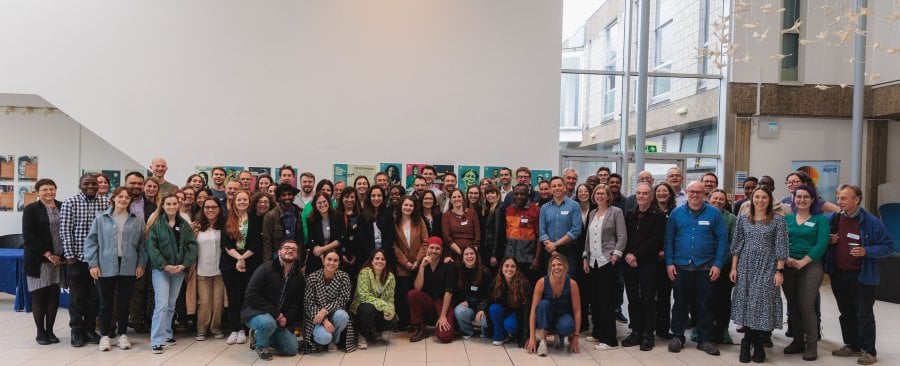
LSHTM Malaria Centre Retreat, April 2023 (Credit: William Jones-Warner for LSHTM)
This annual event showcases the work of our members from across a breadth of disciplines, encourages interaction between early career and senior staff, and supports our ultimate goal of ending malaria for good. Kicking off the first day, we heard talks ranging from the attractiveness of our skin biome (aka what ensures some of us get bitten over others), to the latest on the promising malaria vaccine, R21, chloroquine resistance evolution, and economic evaluation for malaria vector control. A similarly varied session followed, from bench – genomic investigation into the neglected malaria parasite, Plasmodium malariae – to field, with economic evaluation aspects from the Plus Project in West Africa. We were also delighted that Njelembo Mbewe and Patrick Tungu could join us in-person from Tanzania to present their latest work evaluating the use of VECTRON™ T500 for indoor residual spraying.
Decolonisation plays an integral part in any present and future malaria research. We at the Centre want to turn words into action so were thrilled when Dr Rohan Deb Roy, University of Reading, agreed to speak at our retreat; his talk was both challenging and thought-provoking. To prompt tangible next steps, we heard an overview of some of the work ongoing at LSHTM to decolonise our teaching. An interactive session followed, from which we will form the basis of our Decolonising the Malaria Centre charter. Watch this space!
Moving from structural change to amateur dramatics, and our final session of the day showcased the work of a public engagement project in The Gambia which utilised theatre and dance to share research findings from the INDIE project, then on to molecular monitoring of insecticide resistance in an elimination setting, and finally Prof Asante gave an excellent overview of how LSHTM researchers past & present collaborate with Kintampo Health Research Centre, Ghana.
A retreat would not be complete without a turbo talk session, where our speakers are given 60 seconds and one slide (yes, some of you broke the rules) to detail their current research project. The more concise, the better.
Scientific presentation and discussion should naturally be followed by an opportunity to embrace your creative side, and we were wowed by the play-doh interpretations of gametocytes, schizont etc. (see below). Tate Modern, we are looking at you…
Another day of great science in store with our first session featuring the latest from the lab - in search of AMA1 (apical membrane antigen 1), recurrent infection with P. vivax parasites in Ethiopia, and one of our prize-winning talks investigating cerebral malaria from a neuroscientific perspective.
25 years is a long time in malaria research, so the next session took stock of our achievements and emphasised moving forward together with a focus on equitable partnerships, building on existing collaboration, and the next generation of malariologists.
Our final two sessions were as packed and varied as the rest, thanks to our visiting PhD student Olu Odfuwa, for his detailed talk on testing the use of nets to screen eaves, then a discussion of the importance of doing careful sample size estimations in cluster randomised trials, and back to the bench for parasite multiplication rate differences and antibody cell responses to Plasmodium falciparum.
Online attendees and speakers played a vital role in our retreat and it was fantastic to see Dr Eniyou on screen, based in The Gambia, to take us through genetic diversity of Plasmodium malariae in sub-Saharan Africa, more cost-effectiveness in the form of a conceptual model for MiP, and last but by no means least, acoustic engineering and a human-parasite transmission suite at LSHTM (which can be contacted at malariatransmission@lshtm.ac.uk). Another huge congratulations to our winning speakers and a thank you to everyone for your participation, it cannot be overstated how important these meetings are.
It’s worth noting that this was our most sustainable retreat to date, with a fully vegetarian menu, travel via public transport (plus one cyclist!), limited print outs, hybrid options, and environmentally friendly prizes.
Until next year!
PS. If you would like to get in contact with any of our speakers or have a look at the programme, feel free to email malaria@lshtm.ac.uk and we will put you in touch.
If you enjoyed this article and would like to build a career in global health, we offer a range of MSc programmes covering health and data, infectious and tropical diseases, population health, and public health and policy.
Available on campus or online, including flexible study that works around your work and home life, be part of a global community at the UK's no.1 public health university.







